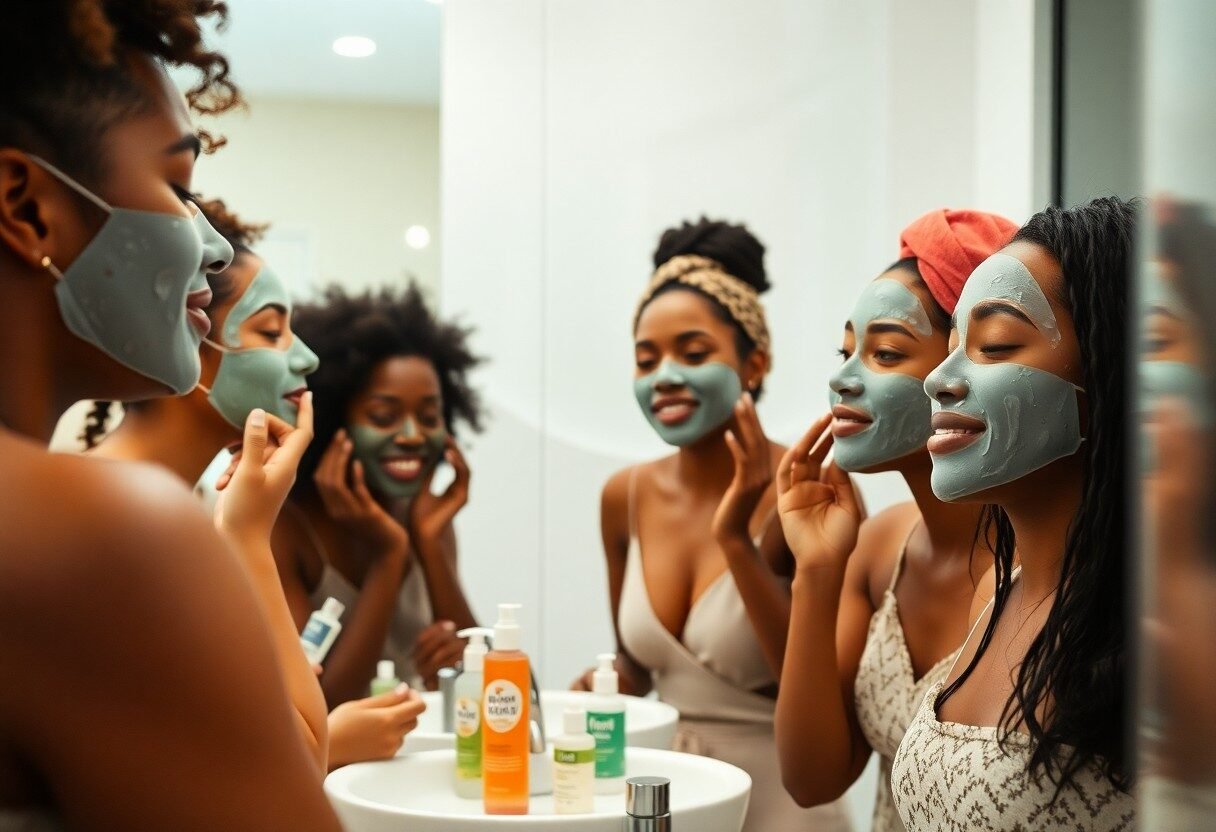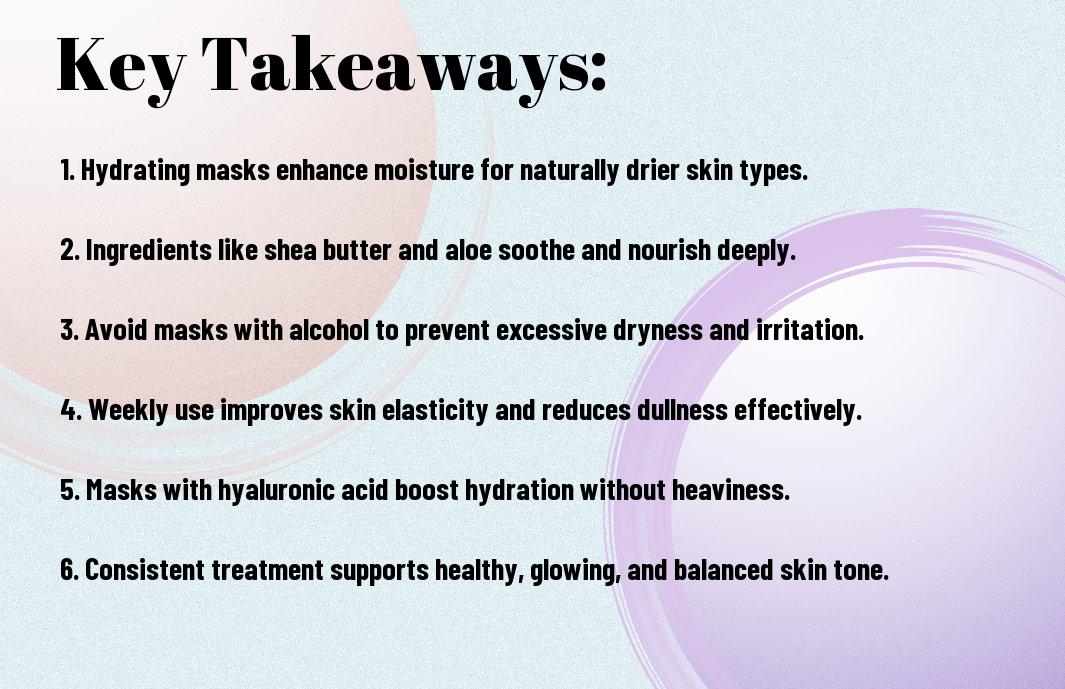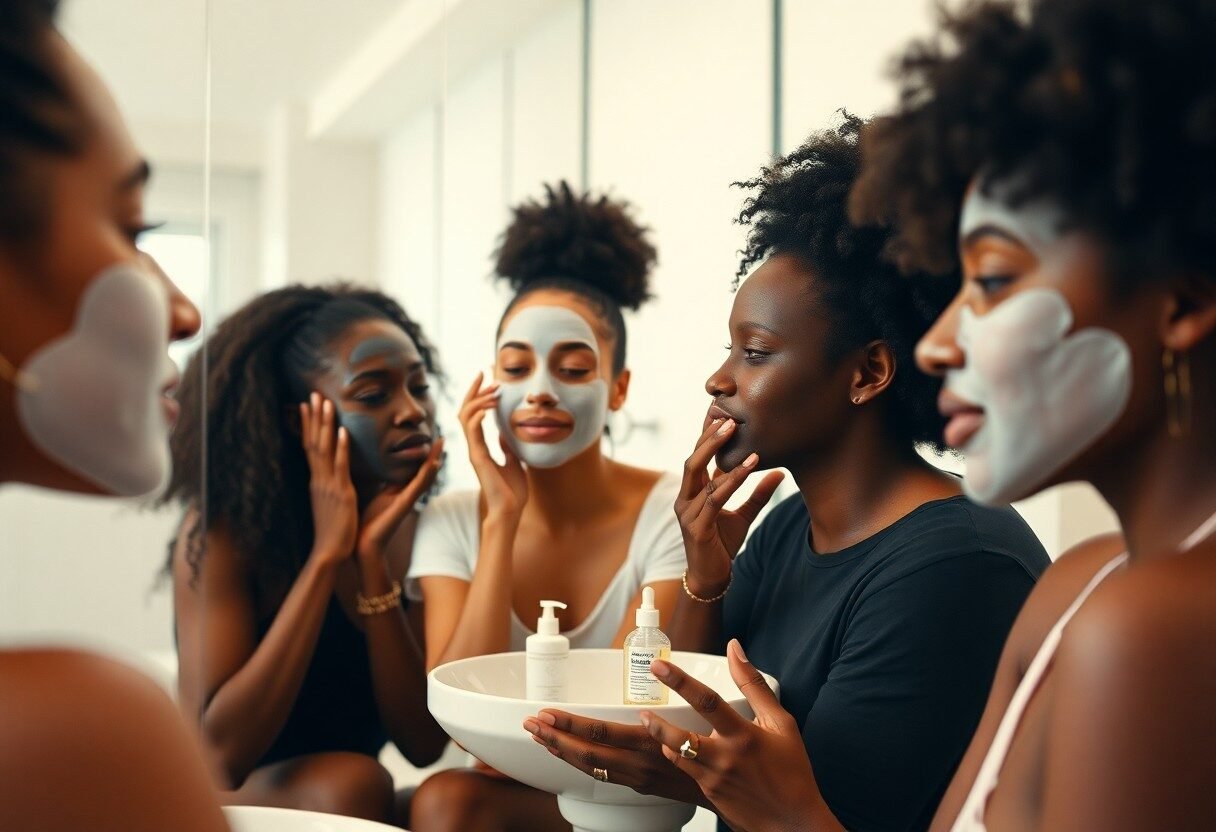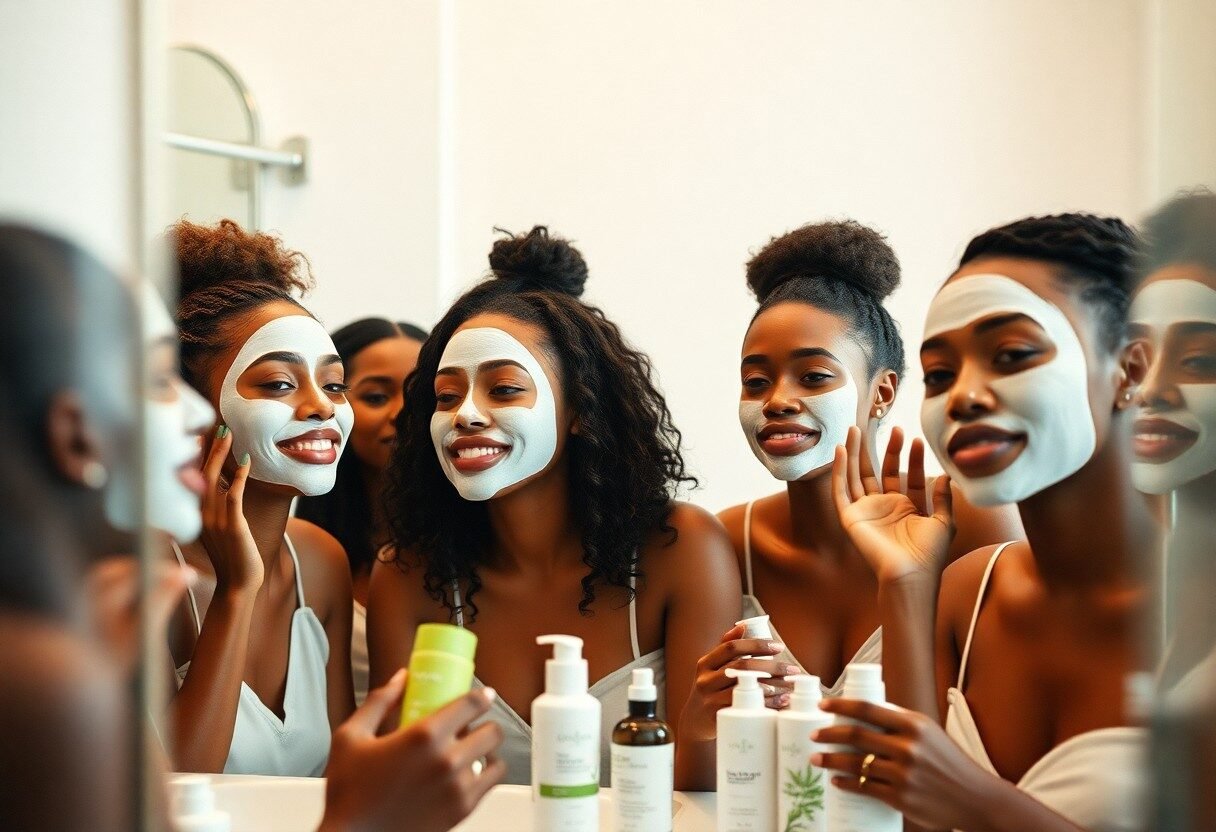
Many women of color struggle with unique skin challenges, including dryness and uneven texture, making hydration vital. In this blog post, I will share my insights on the most effective hydrating masks and treatments designed specifically for your beautiful skin tone. From ingredients to look for to the best products that cater to your needs, I’ll guide you through a selection that will enhance your skin’s natural radiance while addressing common concerns. Let’s examine how you can achieve and maintain that healthy, glowing complexion you deserve.
Key Takeaways:
- Hydrating masks and treatments specifically formulated for women of color can effectively address common skin concerns such as dryness, hyperpigmentation, and uneven skin tone.
- Ingredients like hyaluronic acid, glycerin, and aloe vera are beneficial for hydration and can enhance the moisture barrier of darker skin tones.
- Shea butter, coconut oil, and jojoba oil are often included in products to provide deep hydration and nourishment for textured skin.
- Look for masks and treatments that contain antioxidants like vitamin C and E, which can help brighten skin and improve overall appearance.
- Consider patch testing new products, as skin sensitivities can vary among different skin types and shades.
- Hydrating masks should be used regularly, ideally 1-2 times per week, to maintain optimal moisture levels and skin health.
- Consulting with a dermatologist or skincare professional can help identify the best hydrating treatments tailored to individual skin needs and conditions.

The Unique Skin Needs of Women of Color
Understanding Melanin-Rich Skin
Melanin-rich skin exhibits a beautiful range of tones, from deep espresso to golden caramel. This higher melanin content provides some natural sun protection, which can reduce the risk of sunburn and skin cancer. However, it also means that I must pay extra attention to hydration and moisture retention, as this skin type tends to be more prone to dryness. Products that boost hydration without being overly heavy are imperative for maintaining the skin’s natural balance.
Common Skin Conditions: Hyperpigmentation and Dehydration
Hyperpigmentation arises when the skin produces excess melanin, often triggered by inflammation, hormonal changes, or sun exposure. This leads to darker patches on the skin, particularly on the cheeks and forehead. Dehydration affects all skin types but can be more pronounced in women of color due to environmental factors. Recognizing these conditions helps tailor effective treatments that specifically address the visible signs and underlying causes.
Conditions like hyperpigmentation and dehydration often go hand-in-hand. I’ve seen firsthand how over-exfoliating or using harsh products can exacerbate both issues. When the skin is dehydrated, it might produce even more melanin as a protective response, leading to dark patches that can be tough to treat. Incorporating ingredients like hyaluronic acid and vitamin C into my routine has been key for hydration and addressing uneven skin tone. Using hydrating masks rich in antioxidants also promotes a more radiant complexion while addressing these common concerns comprehensively.
The Importance of Hydration in Skin Health
How Dehydration Affects Skin Appearance
Dehydration can result in a lackluster complexion, making the skin appear dull and lifeless. You may notice an increase in dryness, flakiness, or even the development of fine lines, as the skin struggles to retain moisture. When your skin is not adequately hydrated, it loses its natural bounce and elasticity, which can lead to a rough texture. Visible signs of dehydration include redness, irritation, and a general sense of discomfort that can take a toll on your confidence.
The Role of Hydration in Preventing Premature Aging
Hydration is a key factor in maintaining youthful, resilient skin. Well-hydrated skin can better fend off environmental stressors and resist the formation of wrinkles. Adequate moisture levels support the skin’s barrier function, which helps lock in hydration and nutrients while keeping out harmful substances. Studies have shown that individuals with well-hydrated skin report fewer signs of aging, including sagging and uneven skin tone.
As time wears on, your skin’s natural ability to retain moisture diminishes, making hydration even more paramount. Ingredients such as hyaluronic acid, found in many hydrating masks, can hold up to 1,000 times its weight in water, providing skin with a plump, youthful appearance. Consistent use of hydrating treatments nourishes the skin, replenishing vital moisture and keeping your complexion vibrant and youthful. The stark difference between hydrated and dehydrated skin not only impacts your appearance but also your skin’s overall health, making a solid hydration routine a non-negotiable aspect of your skincare regimen.
Key Ingredients to Look for in Hydrating Masks
Natural Moisturizers: Hyaluronic Acid and Aloe Vera
Hyaluronic acid is a powerful humectant, capable of holding up to 1,000 times its weight in moisture, making it a game-changer for hydration. Combining it with aloe vera enhances the moisturizing effects while also soothing your skin with its anti-inflammatory properties. When included in hydrating masks, these ingredients work together to boost elasticity and plumpness, leaving your skin looking radiant and healthy.
Nutrient-Rich Oils: Jojoba, Argan, and Marula
Incorporating nutrient-rich oils like jojoba, argan, and marula into your hydrating regimen brings enhanced nourishment and moisture retention. Each of these oils contains unique fatty acids and antioxidants that benefit melanin-rich skin, promoting a smoother complexion while tackling dryness.
For instance, jojoba oil closely mimics the skin’s natural sebum, making it excellent for balancing oily and dry areas. Argan oil is rich in vitamin E and fatty acids, which are necessary for preventing moisture loss and protecting against environmental stressors. Marula oil, on the other hand, offers anti-aging benefits with its high levels of antioxidants, making it perfect for those looking to maintain youthful, glowing skin. Choosing masks with these oils ensures your skin receives the nourishment it craves, restoring its natural radiance and resilience.

Popular Hydrating Mask Options for Diverse Skin Types
In terms of hydrating masks, women of color have a plethora of options that cater to their unique skin needs. Each type of mask can provide varying benefits, depending on your skin type and concerns. Below, I’ve summarized popular hydrating mask choices in a convenient table format:
| Mask Type | Key Benefits |
|---|---|
| Sheet Masks | Instant hydration and easy application for a quick boost. |
| Gel Masks | Soothing properties that cool the skin, ideal for inflamed or sensitive types. |
| Cream Masks | Deep moisturization particularly good for dry or textured skin. |
| Overnight Masks | Works while you sleep, maximizing hydration and rejuvenation. |
| DIY Masks | Customizable hydration using natural ingredients easily found at home. |
Recognizing your skin type and specific needs is the first step towards making an informed decision about the perfect hydrating mask for you.
Gel Masks vs. Cream Masks: Which Is Right for You?
Gel masks are often lightweight and offer a refreshing sensation upon application, making them perfect for hot climates or when your skin is feeling particularly inflamed. In contrast, cream masks provide a thick, rich texture that deeply penetrates the skin, making them ideal for those with dry skin or seeking intensive hydration. Depending on your current skin condition and what you’re hoping to achieve, you may prefer one over the other.
Best Drugstore Picks vs. Luxe Spa Treatments
When comparing hydrating masks, drugstore options can be surprisingly effective and budget-friendly. Products like Neutrogena Hydro Boost Water Gel Mask or Garnier SkinActive Moisture Bomb are popular choices that deliver hydration without breaking the bank. Luxury spa treatments, on the other hand, often utilize high-end ingredients and technology for a spa-like experience. Brands like Dr. Dennis Gross or Tata Harper offer sophisticated treatments that leave your skin glowing; however, they often come with a hefty price tag.
Choosing between drugstore picks and luxe treatments ensures there’s something for everyone. Many drugstore masks contain effective ingredients, yet the luxurious experience of a spa treatment can be unparalleled. Consider your budget and desired skincare results before committing. Hydration doesn’t have to be expensive, but investing in quality ingredients may yield far better results for melanin-rich skin.
DIY Hydrating Treatments: Simple Recipes and Techniques
Natural Ingredients You Can Find at Home
Creating your own hydrating masks can be simple and effective using ingredients you likely have in your kitchen. Combine honey for its humectant properties with mashed avocado, which is rich in fatty acids and vitamins. Alternatively, I love mixing plain yogurt with a splash of fresh lemon juice for a refreshing mask that brightens and moisturizes. Oatmeal is another fantastic base, soothing inflammation while adding moisture when combined with water or milk.
Application Methods for Maximum Effectiveness
How you apply your DIY mask can significantly impact its effectiveness. Always start with a clean face to allow the ingredients to penetrate deeper. Using a brush or your fingers, gently apply the mask in upward circular motions. This not only helps distribute the product evenly but also stimulates blood circulation. For enhanced absorption, I like to apply a warm, damp cloth over the mask for five minutes, allowing your skin to soak up all the nourishing goodness.
As you apply your hydrating mask, consider taking a moment to enjoy the experience—if you can, setting aside 20 minutes to relax while the mask works its magic can be beneficial. Try to keep the room warm and indulge in a little self-care. This not only serves to keep your skin cozy, but also promotes relaxation, allowing the ingredients to be even more effective. Following up with a light moisturizer post-treatment locks in hydration, ensuring your skin feels supple and rejuvenated.
Expert Tips for Enhancing Your Hydration Routine
- Select masks that are suited for your specific skin type, whether it’s oily, dry, or combination.
- Always apply masks on clean skin for better absorption of hydrating ingredients.
- Pair your hydrating mask with a moisturizer to lock in moisture and amplify its effects.
- For maximum hydration, use a mask at least once or twice a week, depending on your skin’s needs.
- Consider layering a hydrating serum underneath your mask for a boost of active ingredients.
Incorporating Masks into Your Weekly Skincare Regimen
Integrating hydrating masks into your weekly skincare regimen enhances overall skin health. Applying a mask once or twice a week allows your skin to absorb a variety of nourishing ingredients without feeling overwhelmed. I often schedule my mask sessions on Sundays for a refreshing start to the week, ensuring I give my skin the attention it deserves. Balance is key, so always follow up with a good moisturizer to seal in the hydration.
Complementary Hydration Strategies: Diet and Lifestyle
Maximizing hydration involves more than just topical treatments; your diet and lifestyle play a critical role. Consuming hydrating foods such as cucumbers, watermelon, and leafy greens can significantly boost skin moisture from the inside. Staying hydrated by drinking plenty of water throughout the day is also vital. Additionally, reducing salt intake and avoiding excessive alcohol can prevent dehydration and help maintain healthy skin.
Building a comprehensive hydration strategy requires you to focus on both what you put on your skin and what you put into your body. Antioxidant-rich foods, like berries and nuts, support skin health while helping combat dryness. Incorporating omega-3 fatty acids from sources such as fish, chia seeds, and flaxseeds can improve your skin’s lipid barrier, allowing for better moisture retention. Engaging in activities like yoga or meditation can reduce stress, which often exacerbates dehydration issues. This holistic approach not only enhances the effectiveness of your hydrating masks but creates a radiant, healthy complexion over time.

Cultural Perspectives on Skincare and Hydration
The Influence of Heritage on Skincare Choices
Every culture offers unique perspectives on skincare, profoundly shaped by historical practices and natural resources. For instance, African American women might lean towards shea butter and coconut oil for their hydrating properties, stemming from ancestral knowledge passed down through generations. Similarly, women of Asian descent often incorporate rice water or green tea in their routines, celebrating the benefits of traditional ingredients revered for their skin-enhancing qualities. Your heritage can significantly influence your skincare choices, making it important to explore and embrace these time-honored rituals.
Celebrating Diversity in Hydrating Practices
This celebration goes beyond recognizing what works for different skin types; it acknowledges the rich tapestry of rituals and ingredients that various cultures offer. For instance, many Indigenous communities harness local botanicals, creating hydrating masks from plants that are both effective and sustainable. These practices not only hydrate the skin but also convey a story, teaching us about the cultural significance of each ingredient. As you integrate diverse hydrating practices into your routine, consider the meanings behind them and the variety of benefits they can provide, adding both nourishment to your skin and depth to your understanding of global skincare traditions.
Conclusion
Conclusively, hydrating masks and treatments tailored for women of color are crucial for achieving and maintaining healthy, radiant skin. I encourage you to explore various options that cater specifically to your skin type and needs, ensuring that your skincare routine is effective and empowering. By incorporating these products into your regimen, you can enhance your skin’s moisture levels, combat dryness, and promote a glowing complexion that celebrates your unique beauty.
FAQ
Q: What are the benefits of using hydrating masks for women of color?
A: Hydrating masks provide intense moisture to the skin, helping to combat dryness and improve overall skin texture. They can enhance radiance, reduce the appearance of fine lines, and restore a plump, youthful look. For women of color, these masks can also help in addressing hyperpigmentation and uneven skin tone, leading to a more balanced complexion.
Q: How often should I use a hydrating mask?
A: It is generally recommended to use a hydrating mask 1-2 times a week, depending on your skin type and needs. For those with dry or dehydrated skin, you may opt for more frequent use, while oily or combination skin types might prefer less frequent applications to avoid overhydration.
Q: What ingredients should I look for in hydrating masks?
A: Look for ingredients like hyaluronic acid, glycerin, aloe vera, and shea butter. These components are excellent for attracting and retaining moisture. Additionally, natural oils such as jojoba oil and argan oil can provide nourishment. Antioxidants, like vitamin C and E, are also beneficial for promoting a healthy glow.
Q: Can hydrating masks help with uneven skin tone?
A: Yes, hydrating masks can assist in evening out skin tone through their moisturizing properties. Hydration helps to plump the skin, making dark spots and uneven texture less noticeable. Masks containing brightening ingredients, like vitamin C or licorice extract, can further enhance this effect.
Q: Are there any DIY hydrating mask recipes suitable for women of color?
A: Absolutely! A simple DIY hydrating mask can be made using mashed avocado and honey. Avocado provides healthy fats and moisture, while honey acts as a natural humectant. Another option is blending yogurt with aloe vera gel for a soothing and hydrating treatment. Ensure to patch-test any homemade mask to avoid adverse reactions.
Q: How do I know if a hydrating mask is suitable for my skin type?
A: To determine if a hydrating mask is suitable, consider its ingredients and your skin type. For oily skin, opt for lighter formulas that won’t clog pores. Dry skin types may benefit from creamier, richer masks. Sensitive skin individuals should look for masks that are free of fragrances and harsh chemicals.
Q: Can hydrating masks be used on sensitive or acne-prone skin?
A: Yes, many hydrating masks can be beneficial for sensitive or acne-prone skin, but it is important to choose products specifically formulated for these skin types. Look for masks labeled as non-comedogenic and hypoallergenic. Ingredients like green tea extract, chamomile, and aloe vera can provide hydration while soothing irritated skin.











